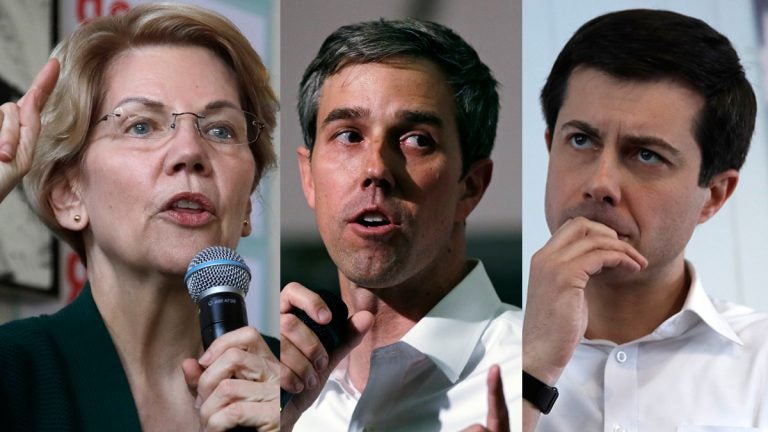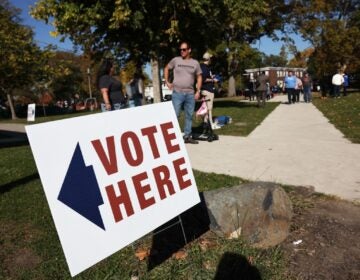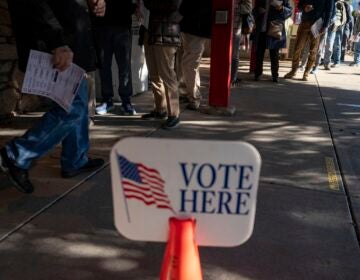The Electoral College is trending. Guess why.
At least three Democratic presidential hopefuls — Elizabeth Warren, Beto O'Rourke, and Pete Buttigieg — are currently calling for the artifact's abolition.

(From left) Democratic presidential candidate Sen. Elizabeth Warren, D-Mass.; Former Texas congressman Beto O'Rourke; and Sound Bend, Indiana Mayor Pete Buttigieg (Elise Amendola, Charles Krupa, and Charles Krupa/Associated Press)
In a report 50 years ago, the American Bar Association said that presidents should be elected by the popular vote, and that the Electoral College should be abolished because it’s “archaic, undemocratic, complex, ambiguous, indirect, and dangerous.” The report received a bipartisan endorsement from Hubert Humphrey, the Democrat who lost the ’68 election, and from Richard Nixon, the Republican who won.
Fifty years later, we’re still stuck with the “undemocratic” and “dangerous” 18th-century artifact that has awarded the White House to the popular vote loser twice in the last five elections. The rest of the western world practices direct democracy — the candidate or party with the most votes wins — but we slog on, mindlessly violating the fundamental principle that every vote should be equal. Right now, only the votes in a small number of “battleground states” really matter; Republican voters in solid blue states and Democratic voters in solid red states are irrelevant.
But the good news, assuming it’s not ephemeral, is that at least three Democratic presidential hopefuls — Elizabeth Warren, Beto O’Rourke, and Pete Buttigieg — are currently calling for the artifact’s abolition. Warren says that “every vote matters … And that means get rid of the Electoral College.” O’Rourke sees “a lot of wisdom” in abolition, because the Electoral College “puts some states out of play altogether.” Buttigieg says of the College, “It’s gotta go. We need a national popular vote. It would be reassuring from the perspective of believing that we’re a democracy.”
And in a related development, the government of Colorado decided on Sunday to join 11 other states that have endorsed the National Popular Vote Interstate Compact. These states, plus the District of Columbia, would officially pledge to award their electoral votes to the candidate that wins the national popular vote. This is legal, because the Constitution says that states can award their electoral votes however they see fit. With Colorado on board, states with 181 electoral votes have now joined the pact; Delaware and New Mexico are reportedly on deck.
The pact won’t work unless enough states, totaling the magic 270, sign on — and that’s a heavy lift. But all this action is keeping reform in the national conversation, and most Americans have no problem with that. In a national poll last year, 65 percent of the citizenry endorsed the election of presidents by popular vote; only 32 percent supported the Electoral College. The Pew Research Center found strong sentiment as well, 55 to 41.
Thanks mostly to the Democratic trifecta, the Electoral College has been trending this week on Twitter — right up there with George Conway, husband of Kellyanne, who’s currently being assailed by Donald Trump as “a stone cold LOSER & husband from hell!” (Don’t ask. It’s not worth getting into.) And because the College is trending, the most recent beneficiary of its dangerous effects has naturally decided to weight in. Earlier today, Trump (who lost the popular vote by nearly three million) assailed the College’s “brilliance.” That echoed what he tweeted right after his election, when he lauded the College as “genius.” But those kudos conflict with what he tweeted in 2012, when he called the College “a disaster for a democracy.”
He got it right the first time — as he continues to demonstrate.
I suppose the preceding sentence sounds partisan. But I recall writing 11 years ago that the Electoral College was a disaster, “a remnant of the powdered wig era,” and that it nearly distorted the presidential election of 2004. We’ve forgotten that, in 2004, a switch of just 59,388 votes in Ohio would’ve awarded the presidency to Democrat John Kerry — even though he would’ve lost the national popular vote to incumbent George W. Bush by roughly 3.5 million. Democrats would’ve been fine with winning that way, but it would’ve been just as wrong as Trump “winning” by losing in 2016.
It’s a tribal thing. Republicans in our lifetimes have twice benefited from the distorting effects of the College — with Trump, and with Bush in 2000 — so naturally they’re stalwart defenders of the status quo, fully in sync with Trump’s flip-flop. But what few people remember is that on the eve of the Bush-Gore election, when it was feasible that Gore might win the race with sufficient electoral votes but a deficit in the popular vote, the Bush camp had a plan for that scenario. It was reportedly prepared to denounce the Electoral College as a violation of “the popular will.” In the words of one Bush aide, “The one thing we don’t do is roll over. We fight.”
The current GOP mantra is that if the Electoral College was ditched in favor of the popular vote (either by the National Compact or by the more cumbersome constitutional amendment process), presidential candidates would focus only on a handful of the states with the biggest populations. But that’s basically what happens under our current system; the candidates target a handful of “battleground states,” where the outcome is deemed to be in doubt, and all the others are mostly ignored. Republican voters in blue New York and Democratic voters in red Texas get no attention and have virtually no clout.
But if the candidates were competing nationwide to win the popular vote, everyone would be equal. Roughly 40 percent of Alabamans vote Democratic in presidential elections, and a Democratic candidate could mine those votes and make them count. Roughly 35 to 40 percent of Californians vote Republican in presidential elections, and a Republican candidate could mine those votes and make them count.
The U.S. Supreme Court has twice endorsed the principle of “one person, one vote” — in 1962 and 1964 — and it’s time we put that into practice when we pick presidents. A voter’s clout, or lack thereof, should not be hostage to geography. The concept is really quite simple: The candidate with the most votes wins. End of story.
WHYY is your source for fact-based, in-depth journalism and information. As a nonprofit organization, we rely on financial support from readers like you. Please give today.




